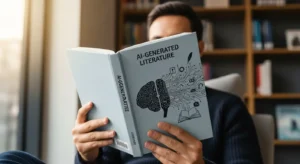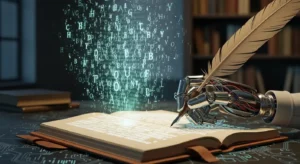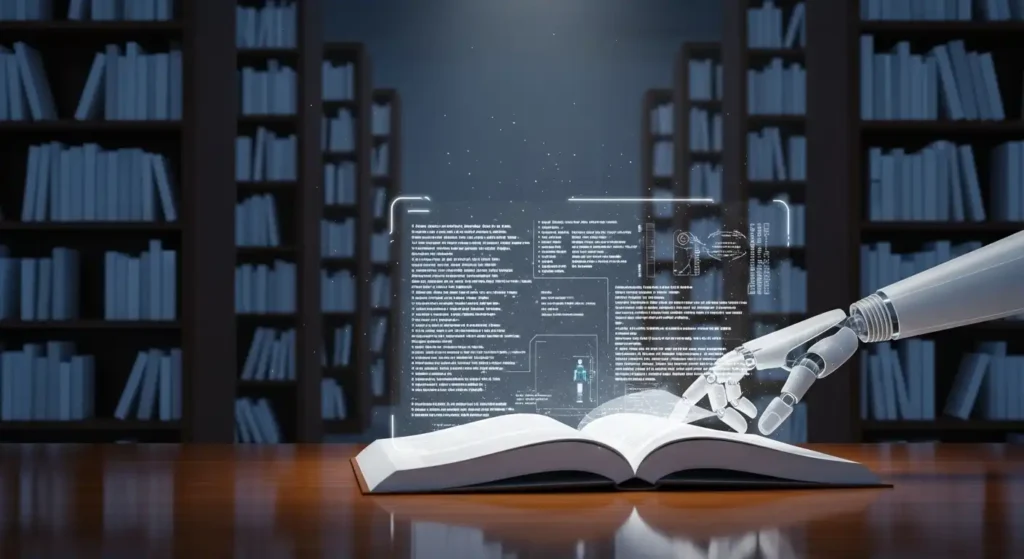Introduction
The literary world is undergoing a transformation. As technology advances, the role of artificial intelligence (AI) in the creative process is becoming more pronounced. In 2025, AI-generated literature is emerging as a powerful force in book publishing. Writers, publishers, and readers are all discovering the potential of AI-driven storytelling, which is poised to revolutionize how books are written, published, and consumed. But what does this mean for the future of literature?
AI-generated literature offers unique opportunities for innovation, efficiency, and creativity. In this blog post, we will explore the growing influence of AI in book publishing, how it’s changing the way stories are told, and the challenges and ethical concerns that come with it.
The Rise of AI-Generated Literature
 Artificial intelligence has come a long way in recent years. In the past, AI was primarily used for tasks like data processing and automation. However, with advancements in natural language processing (NLP) and machine learning, AI is now capable of creating coherent, creative, and even emotional text. Authors are now using AI writing tools to assist with everything from brainstorming ideas to generating entire books.
Artificial intelligence has come a long way in recent years. In the past, AI was primarily used for tasks like data processing and automation. However, with advancements in natural language processing (NLP) and machine learning, AI is now capable of creating coherent, creative, and even emotional text. Authors are now using AI writing tools to assist with everything from brainstorming ideas to generating entire books.
AI-generated literature is not just a trend—it’s becoming a significant part of the literary landscape. In 2025, AI is playing a key role in writing books across various genres, from science fiction and fantasy to romance and thriller. Some authors are using AI to help them write, while others are experimenting with fully AI-generated works. This growing trend is reshaping the publishing industry by providing new ways to create and distribute content.
How AI is Transforming Book Writing
One of the most exciting aspects of AI-generated literature is its ability to enhance the writing process. AI tools can assist authors by suggesting plot points, developing characters, and even generating dialogue. With the help of AI, writers can overcome writer’s block, explore new narrative possibilities, and streamline the writing process.
Some of the most popular AI writing tools include OpenAI’s GPT-3 and the newer GPT-4, which can generate entire paragraphs or chapters based on a prompt. These tools use vast databases of text to understand language patterns and can generate text that is coherent, engaging, and often indistinguishable from human-written content. Writers can input a brief summary or set of instructions, and the AI will generate a story based on those parameters.
AI-generated literature also has the potential to democratize writing. Aspiring authors who may lack the time or resources to write a full-length novel can now use AI tools to bring their ideas to life. These tools make the writing process more accessible, enabling a wider range of voices to be heard in the literary world.
The Future of AI-Generated Books
As AI technology continues to evolve, its influence on the book publishing industry will only grow. AI-generated books are already being sold on platforms like Amazon and Audible, and in the coming years, we can expect to see even more books created by AI. Publishers are beginning to embrace AI not only for writing but also for editing and proofreading, making the entire publishing process more efficient.
In the future, AI could revolutionize the way books are personalized for readers. Imagine a book that adapts to your preferences as you read, adjusting plotlines or character arcs based on your choices. This level of personalization is possible with AI, and it’s likely that we will see more interactive and dynamic storytelling in the coming years.
Challenges and Ethical Considerations
While AI-generated literature offers many benefits, it also raises important questions and concerns. One of the biggest challenges is ensuring that AI-generated content is original and not plagiarized. Since AI writing tools are trained on large datasets of existing text, there is the potential for AI to generate content that closely resembles existing works.
There are also ethical concerns regarding authorship and copyright. If a book is entirely written by an AI, who owns the rights to that book? Should the AI developer or the user who generated the content be credited as the author? These are questions that the literary and legal communities will need to address as AI-generated literature becomes more common.
Another concern is the potential for AI to replace human writers. While AI can assist with writing, it lacks the creativity, emotion, and experience that human authors bring to their work. AI-generated literature can enhance the writing process, but it cannot replace the unique perspectives and voices of human authors.
AI and the Publishing Industry: Opportunities and Risks
 The rise of AI-generated literature presents both opportunities and risks for the publishing industry. On the one hand, AI has the potential to reduce costs, improve efficiency, and open up new possibilities for content creation. On the other hand, there is a risk that AI-generated books could flood the market, making it harder for traditional authors to stand out and for readers to find high-quality content.
The rise of AI-generated literature presents both opportunities and risks for the publishing industry. On the one hand, AI has the potential to reduce costs, improve efficiency, and open up new possibilities for content creation. On the other hand, there is a risk that AI-generated books could flood the market, making it harder for traditional authors to stand out and for readers to find high-quality content.
Publishers will need to balance the use of AI with the need for authentic, human-driven storytelling. AI-generated literature should be viewed as a tool to complement human creativity, not a replacement for it. The future of publishing will likely involve a mix of both AI-generated and human-written content, with readers enjoying a diverse array of stories created using a combination of both methods.
Conclusion
AI-generated literature is transforming the world of book publishing in 2025. With its ability to enhance the writing process, increase efficiency, and create personalized reading experiences, AI is paving the way for a new era of storytelling. However, as this technology continues to evolve, it is essential for the literary world to address the ethical and practical challenges that come with it. By embracing AI while preserving the creativity and authenticity of human authors, the future of literature will be one of collaboration between man and machine.
For more insights into the future of literature and technology, visit our Technology in Literature page.
